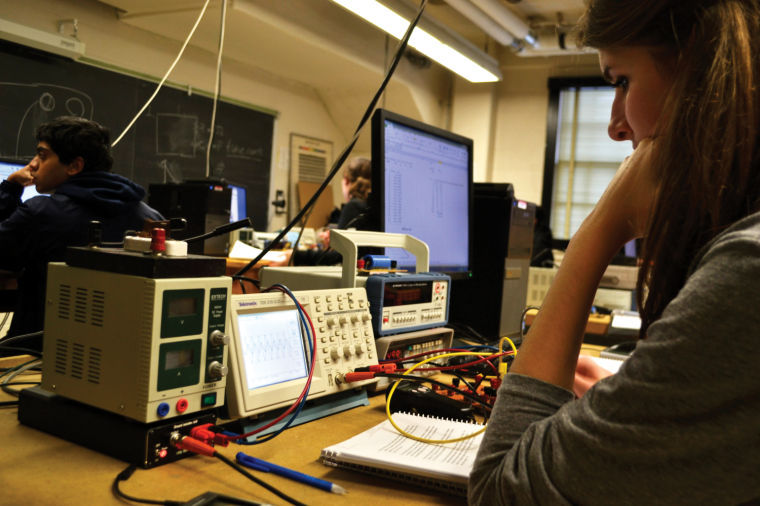
Students in general physics of electrodynamics, light, and relativity experiment with electric pulses.
When Samantha Krahling first came to this university last fall, she thought she was ready to bypass the introductory calculus course and skip to the second level.
What she found, however, was her high school AP AB Calculus class had not prepared her for the rigors of college math. She soon dropped her MATH 131: Calculus II for Life Sciences course and rebounded to MATH 130: Calculus I for the Life Sciences, learning the same derivatives and antiderivatives she had just polished a few months before.
“I was new to college. I had no expectations, and I had to teach the material to myself,” the freshman enrolled in letters and sciences said. “I just couldn’t get used to it.”
Experiences like Krahling’s have prompted some universities to no longer accept Advanced Placement credits in lieu of college courses, re-sparking a long and heated debate about whether standardized tests match the rigor of college courses and indicate future success. At this university, however, AP credits are here to stay, given that research shows scores of four or five on AP exams reveal college-level competence across most courses, department officials said.
At Dartmouth College, AP credits will hit the chopping block starting with the entering class of 2018. The college announced the move based on a condensed version of the AP Psychology exam incoming students took. Of the 100 students who scored a five on the exam, 90 percent failed Dartmouth’s test, according to a New York Times article. Instead, Dartmouth will use AP exams to place students in classes, rather than allowing coursework to replace college credit.
But at this university, students in upper-level classes who used their AP credits tend to be in the top third of GPAs. Students coming straight from introductory courses follow closely behind, while transfer students tend to place in the bottom third of GPAs, according to periodic assessments by several departments.
The university accepted about 3,300 students’ AP credits in fall 2012, a number in line with previous years, said Linda Yokoi, an assistant university registrar. The university encourages applicants to seek AP credit so that “academically successful students may move forward in their programs at an appropriate pace,” according to the Office of the Registrar.
“What I tell parents and students is if I retake a course here, would I learn something additional and have a better grasp of the material? Unequivocally yes,” said Reid Compton, a biology professor and director of the College Park Scholars Life Sciences program. “But we do not want you to waste your time and money retaking lower-level courses.”
Despite these results, students who credit out of introductory classes such as BSCI 105: Principles of Biology I and CHEM 131: Chemistry I — Fundamentals of General Chemistry must hit the ground running in more advanced, rigorous classes such as CHEM 231: Organic Chemistry I and BSCI 207: Principles of Biology III — Organismal Biology, which often have little or no room for refreshing on background and reacquainting students with old material, biology professors said.
And even with research to back up AP credits, tools like the Math Placement Exam — a mandatory exam incoming students take to be placed in math classes — are used as buffers to ensure students are taking courses at the appropriate level.
“While a high score on the AP exams does give a student college credit, the placement exam is the best predictor of success if a student needs any other math courses,” said William Schildknecht, a mathematics department coordinator, adding students who have high AP scores also have high SAT mathematics section and Math Placement Exam scores.
Professors have not evaluated whether AP Biology and Chemistry credit adequately fulfills lab portions of equivalent college courses, which compose a larger chunk of college science courses than they do in high school science courses, said Todd Cooke, a cell biology and molecular genetics professor. Courses such as physics often grant credit based on specific scores on different sections of the AP exam.
Kevin Edinborough, a junior physiology and neurobiology major, raked in 35 AP credits and retook one class — physics, which he said was an “easy A” — to prepare for the MCAT . But unlike Krahling, he said his AP classes have matched the rigor of college coursework.
“In college, you see your professors three times a week for 50 minutes in one semester,” he said. “But in high school, you have an hour and 45 minutes every day for a year. The information has time to sink in.”
Students in humanities and social sciences courses have more time to catch up with old material, especially since many courses — even those with prerequisites – do not build up as heavily and quickly on each other as science-oriented courses do.
In the past 10 years, the Office of the Registrar has tightened its requirements to accept mostly AP scores of fours and fives, with some courses pending department approval, reflecting a continuing challenge to measure academic success and rigor.
“Students may not be succeeding because AP prepares well, but because these students are bright and capable,” Compton said. “Everything is really on a case-by-case basis.”



